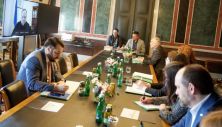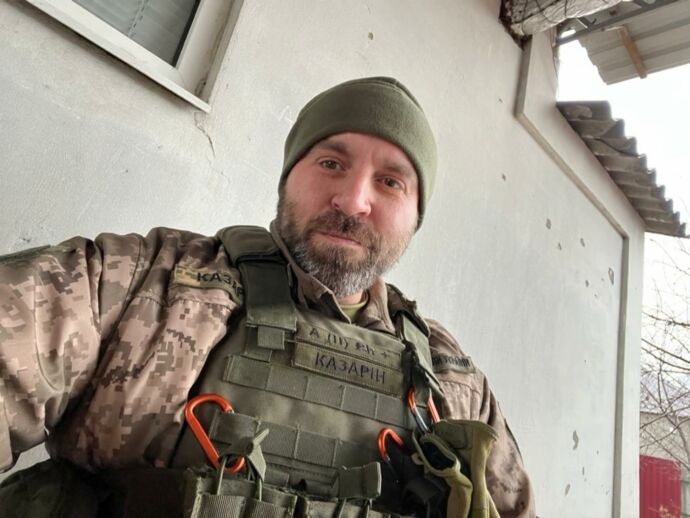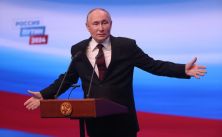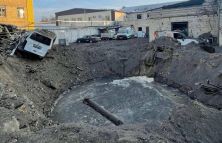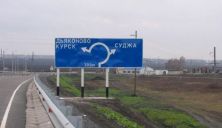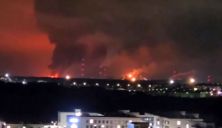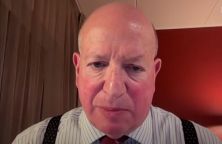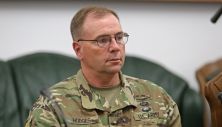I’d never served in the Armed Forces before. Hadn’t even done compulsory military service. I’d always been a journalist – both before 2014, when I lived in Crimea, and after 2014, when Russia annexed Crimea and I had to move to Kyiv. Then in 2022, on day two of Russia’s full-scale invasion, I went and joined the Armed Forces of Ukraine.
When nine years ago Russia seized the Crimean Peninsula from Ukraine, I thought, “People don’t understand what’s happening; they just need it explained.” The world in general and Moscow in particular are mistaken if they think that Russia was welcomed in Crimea. I thought, “If I just do my job as a journalist, the situation will resolve itself.” So I continued to write and broadcast with little effect.
Then in 2022, on day two of Russia’s full-scale invasion, I went and joined the Armed Forces of Ukraine. The situation was crystal clear. No shades of grey now. As we say in Ukraine, “If you need to explain, then you needn’t bother explaining.”
I found myself joining a true people’s army. It contained ordinary workers and company directors, parents and their children, schoolteachers, theatre people and new university graduates. I met two gay men in the queue at the recruitment office. We went on to serve in the same battalion.
I saw directors of private clinics leaving their practices in order to lead medical units in combat brigades on the front line, wedding photographers turning their hand to aerial photoreconnaissance, bartenders becoming artillerymen. Old barriers fell. They don’t matter anymore.
“Good businesspeople make good commanders” is an expression I heard three times: first in Donetsk Oblast from a battalion commander, then near Zaporizhzhia from a recce platoon sergeant, and finally near Kharkiv from a man who was number 88 on the Forbes list of the 100 richest Ukrainians. All three of them had had businesses before the war and all three were good commanders.
Over the past year, the Ukrainian army has grown to be at least three times larger. For every professional service member, there are two or three newly mobilised ones. People bring knowledge and skills from their civilian professions into the army. As no one had got round to telling them “It cannot be done” they set about creating new ways of solving problems, inventing processes and things that showed “Ah, actually it can”.
To get that effect, the army needed horizontal structures, motivation and bottom-up initiative. This is how mobilisation made the Ukrainian army stronger, and why we can tell it didn’t do the same for the Russian army. Russia’s mobilised forces are, still, just cannon fodder.
There is a common saying in Ukraine: “A little Soviet army cannot defeat a big Soviet army”. But everything that has happened in the past year goes to prove that ‘Soviet’ is a really bad description of the Ukrainian army. It has made itself flexible, resourceful and adaptive. It has become an army that can not only defend but also counterattack. And, as armies reflect societies, we can see that Ukrainian society is also completely different from Russian society. Russia is trying to recreate the politics of a previous era, behaving like we all live during the colonial era. The fight we see being fought is not East against West or even Russia against Ukraine. As of 24 February 2022, the past is at war with the future.
Once you reach the front line, you come to an important realisation. Whether you survive is mainly a matter of luck. Training can improve your odds. So can practice and experience. Still, there are things that can’t be reckoned with in all-out war. Random mines. Enemy shells. Friendly fire. Ricochets. The realisation is something you just have to come to terms with sooner or later.
The war in Ukraine is totally different from any war of the last 40 years. Most wars since Iran–Iraq and the Falklands have been fought between regular armies and guerrilla movements. The set-up is simple: tanks, artillery and aircraft on one side; light infantry, mortars and grenade launchers on the other. That was the way of regional conflicts. The Ukraine–Russia war is an exception to the rule.
For the first time in decades, we are seeing a collision of two full-scale military machines. Both possess the full range of weaponry. Both sides employ aircraft, armour and air defences. It is regular army against regular army. This is not at all what the world is used to.
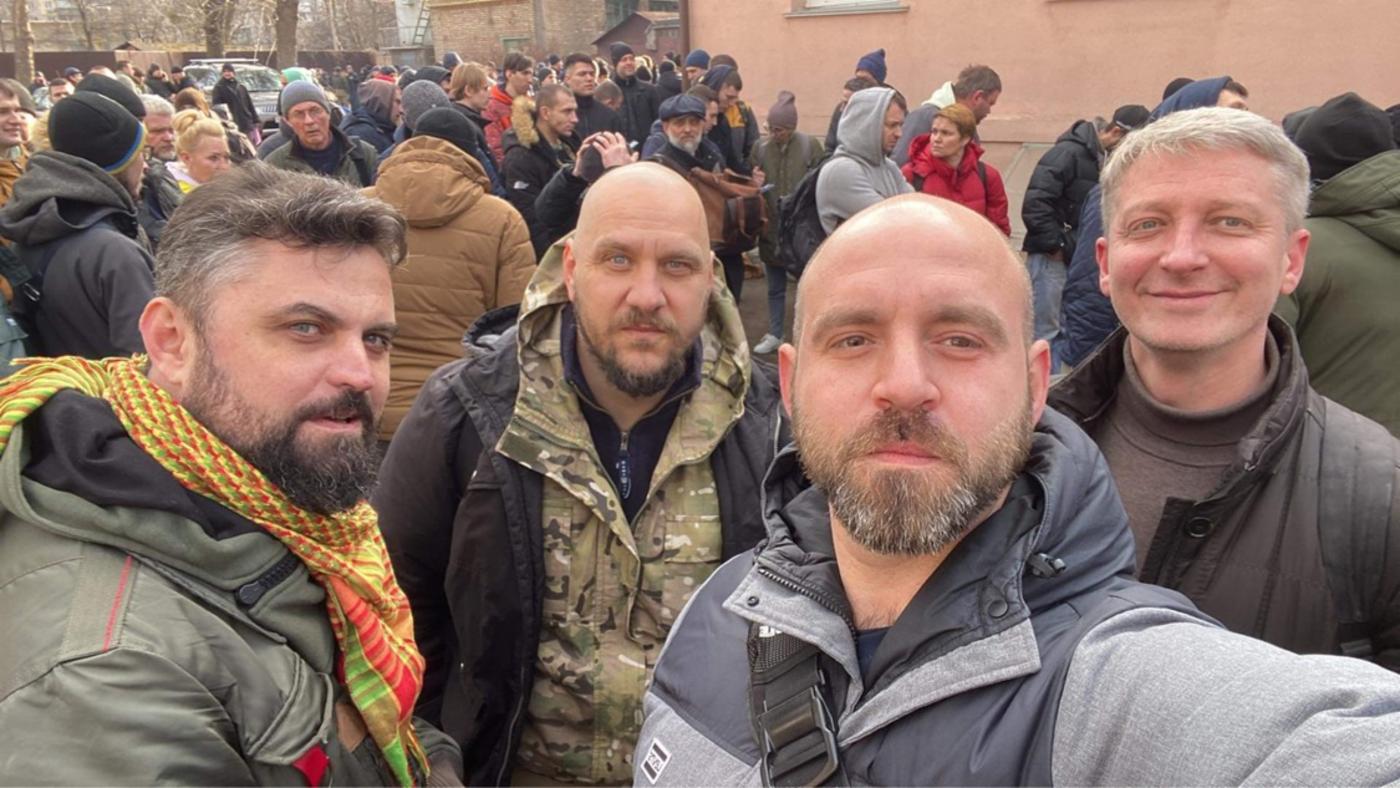
Pavlo Kazarin and others queue at the Ukraine military enlistment office on 25 February 2022.
Many probably thought the Ukrainian army could not withstand the Russian onslaught and the Ukrainian armed forces would disintegrate into guerrilla bands. Therefore, arms that were sent to Ukraine were more likely to be useful to an insurgency. Things turned out differently, and today, Ukraine is talking about receiving aircraft and missiles capable of hitting targets in occupied territory.
But still, the disparity in scale makes itself felt. Russia continues to mobilise and does not count its losses. Ukraine is left playing David to an aggressive Goliath. Presumably, the Kremlin think that they’re way ahead in resources and hope to win a war of attrition.
We know this war will burn through all of Eastern Europe’s remaining Soviet weapons. The whole region will now adopt Western tanks, aircraft and artillery, simply for want of alternatives. Certainly, for now, I still quite often see Soviet weapons at the front, but I think it is only a matter of time before they run out. Ukraine’s stockpiles are not infinite and the intensity of the war is not letting up.
From day one of the war, Russia hoped to divide Ukraine. It tried to drive a wedge between the western and eastern parts of the country, and between the army and political leaders. Putin called for Ukrainian generals to “take power into their own hands”. His propagandists insisted that Ukraine’s civilian population were stuck without power and water because the Ukrainian army refused to surrender. Moscow tried to divide Ukraine, but achieved the opposite.
For decades the Ukrainians persisted, as if by inertia, in thinking of the Second World War as the most important war in their history. Every family had someone who had fought. Just as every family had someone who had fallen victim to fighting or occupation during the War. Now, Russia is doing everything to make this war the Ukrainians’ most important ever.
Being in Ukraine, you can’t help noticing the war when Russian missiles strike towns and cities far from the front line. You can’t help being interested in politics if you depend on them to keep your country’s army supplied with weapons. Now everyone in Ukraine has a connection to the family of a dead soldier, usually at less than six degrees of separation. Volunteering for the army has become the rule, not the exception.
There are hundreds of thousands of soldiers in trenches. Millions of their friends and relations are at home without power. In these circumstances, it doesn’t matter what your language is. Differences become secondary. The past yields to the present. Russia’s invasion forced Ukraine to face some existential questions, and now the country is answering in perfect solidarity. Symbolically, Russian hands are knitting Ukraine together, destroying the usual rubbish about the differentness between the west and east of the country.
At the start of the war, we in the army often spoke about the mood for protest in Russian society. We argued about whether it could lead to demonstrations by Russians on the streets. A year on, we can see such hopes and expectations were naive.
Ultimately, the sociology of any war is more or less the same. At the beginning, there is always an upsurge in patriotism. Over time pacifism increases and not just because an empty fridge trumps a full TV screen. So long as price inflation is cushioned by a feeling of imminent victory, ordinary Russians will go along with it. Therefore, the empty fridge is not enough. The war has to become unwinnable for the Russians.
In other words, the penny-drop moment comes not when funerals begin and poverty sets in. It comes when the funerals and the poverty cease to be meaningful and justified. And, when the penny drops, so what? Russian voters gave away their political rights twenty years ago. Now the only thing left for them to do is to watch as Russia’s authoritarian regime turns totalitarian.
In Russia, now as before, all decisions rest with Vladimir Putin. Most likely, he feels the war is the culmination of his time in power. The result of the war will be his political legacy. That means there is no reason whatsoever for him to stop the invasion. Putin is like a gambler in the casino. He has put all he has on zero and is trying not to lose. Best to be prepared, then, for no end to the war in 2023.
Sanctions will not split Russian society from the Russian leadership, though we continue to monitor how effective they are. The effect is measured not by sociologists but by economists. The less money Russia has in its war chest, the less ability it has to go on the offensive. On that calculation, Western sanctions and Russian corruption are almost a second front helping Ukraine.
Yet all this is about a lot more than Ukraine itself. The result of the confrontation will not just determine the borders of my country. This war will make the rules of behaviour for a century. The question, “Can war be an instrument of politics in the 21st century?” is being decided on the battlefield at this moment. If Ukraine loses and Moscow gets its way, the domino effect might be felt around the world.
Let me repeat: none of the optimism I’ve shared here means the current war will end any time soon. The wars in Bosnia and Croatia lasted four years. The Korean War was three years. In Vietnam, France fought for eight years and so did the United States. So it is best we are ready for this war to be a marathon and not a sprint.
Hoping for a deus ex machina is not going to work. A year into the invasion, we know that. Therefore, the war in Ukraine has ceased to be a matter for the military only. The front is being held by volunteers: businesspeople, IT specialists, pensioners, taxpayers. People who search through the rubble after missile strikes.
This war will shape the continent. It will set rules and draw frontiers. Books will be written and studies done on the reality we face today. We are Harry Potter and William Wallace, the Na’vi and Han Solo. We’re escaping from Shawshank and blowing up the Death Star. We are fighting with the Harkonnens and challenging Thanos. Ukraine is hosting one of the great epics of this century.
We haven’t won yet. But in many ways, we have won.
